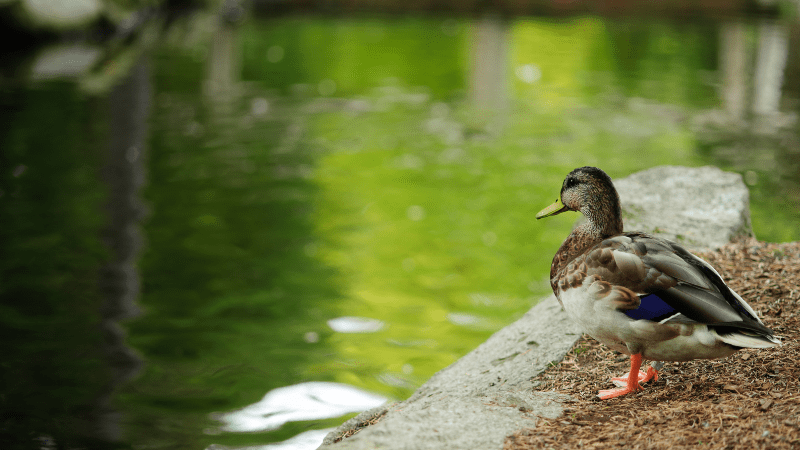How to Attract Ducks to Your Pond (5 Simple Ways)
Pond Academy is reader-supported. Buying through links on our site may earn us an affiliate commission. As an Amazon Associate I earn from qualifying purchases.
Having ducks visit your pond is a fun experience.
But, unless the conditions are right, it can be difficult to attract these types of birds.
So, let's learn how to attract ducks to your pond with five simple tips, how to keep them there, and whether or not ducks are good for your pond.
How To Attract Wild Ducks To Your Pond

You can attract ducks to your pond by providing a habitat that makes them feel safe and comfortable with plenty of food.
However, ducks are notoriously hard to attract to your typical backyard pond. They require a very specific habitat that most backyards just don't provide.
Plus, only a few duck species will truly be comfortable enough to visit your property as it requires being close to human habitation. Wood ducks, Mallards, and Muscovy ducks are some of the waterfowl you might find frequenting backyard ponds.
So, if your region has the right duck species and you want to attract them to your pond, here are five simple ways for how to make your pond attract wild ducks.
- Food: Supplying ample amounts of food, one of their basic needs, is step one in attracting ducks. But, what do ducks eat in a pond? Ducks are omnivores and will eat algae, aquatic weeds, and insects - all of which can be a real nuisance. You can bait ducks to a pond with a wide variety of foods, including seeds, grains, berries, nuts, bird feed, grass, etc. Keep in mind that some species of ducks prefer feeding on small fish, pond snails, and oxygenating plants. So, if you have any of these that you like and want to keep, then attracting ducks might not be the best idea.
- Hospitable Environment: Along with food and water, ducks need shelter and a hospitable environment. The ideal environment will include a large body of water (the larger, the better), a fountain or waterfall to create splashing noise to attract ducks, and varying water depths (shallow shelves and deeper depths for diving) will all help. Adding plants in and around the pond will effectively add another food source and help protect ducks and pond fish from predators and inclement weather. Also, providing nesting sites in the form of shrubs and plants will help keep the ducks around. And, obviously, you don't want a hunting ground nearby, which could scare off ducks.
- Eliminate Chemicals: Herbicides, algaecides, and insecticides, even those deemed safe for use in and around ponds, will only kill food sources for the ducks and potentially eliminate any viable shelter. Also, keep in mind that waterfowl migrate around. Any chemicals they come into contact with in your pond could be carried over to another body of water, which could have detrimental effects. So, choose natural removal methods for algae, weeds, and annoying insects.
- Deter Predators: To make a pond more inviting, you'll want to deter any natural predators from not just the pond but the surrounding area. Foxes, raccoons, coyotes, feral cats, etc., are all seen as predators and should be kept as far away from your land as possible. An owl decoy is a great option to deter these small predators. Even your pet dog or cat may appear like a predator, so it's a good idea to keep them away from your pond as often as possible if you want to maximize the potential for ducks to come.
- Duck Decoys: Adding life-like duck decoys in and around the water is an effective way to attract ducks to your pond that are passing by. And since ducks feel safety in numbers, the more decoys you can add to the water (and around it), the better chance they will attract ducks. Once you've piqued their interest with the decoys and have all of the above methods in place, plenty of food, a hospitable environment with shelter, and no predators around, they will be more likely to stick around.
Get Our Best Pond Tips Sent to Your Inbox for Free!
Join thousands of others and learn from our decades of pond building and maintenance experience! Your pond will thank you!
By subscribing you agree to receive emails from PondAcademy.com. We will always respect your privacy and you can unsubscribe at any time.
How to Keep Ducks on Your Pond
Attracting ducks to your pond or lake is one thing, but getting them to stay is another. After you’ve attracted the ducks, it's important to first give them a reason to stay, and second, make sure they don't get scared off.
- Nesting Sites: Ducks won't stick around if there's no suitable place to nest. For some ducks, having a good amount of aquatic plants and/or shrubs around the water will provide sufficient nesting ground. However, some ducks prefer to nest off the ground. Your best bet is to provide a mix of nesting habitats with ground shrubs and add a duck box to either a nearby tree or simply install it on a post. And make sure your duck box is made of untreated wood as some treatments are toxic to birds.
- Keep Pets Away: House dogs and cats can be seen as a threat by ducks, even if they are friendly. So, aim to keep your pets out of sight, or the ducks probably won't stick around for long.
- Keep Water Accessible: For ducks to stick around, you must keep a hospitable environment year-round. That includes using a de-icer or heater in the colder months to ensure the water is accessible, refraining from covering the water with pond netting in fall, etc. Remember, ducks are very picky about where they nest, so it's important to keep the area in and around the water as habitable as possible.
Are Ducks Good For Ponds?
Aside from the visual appeal of having wild ducks in a pond, they do provide some benefits for your pond or water garden. And they bring with them a few concerns, as well.
Ducks love to eat! And as we mentioned above, they eat a lot of different types of food, including algae, aquatic weeds, and insects, none of which you want in your water.
However, ducks also like to eat small fish (and their eggs) and aquatic plants, both of which you most likely want to keep, especially if you have an ornamental koi pond.
They also need to defecate, thus adding more waste to your water, contributing to sludge, and providing nutrients for algae growth.
And since they travel from one body of water to another, there's the possibility that they will transfer parasites and bacteria to your water.
Whether you want to attract ducks to your pond or not is up to you, just be aware of the pros and cons and have a maintenance plan in place if they decide to stick around for a while.
If your sole purpose is to create a duck hole for duck hunting or waterfowl hunting in general, this may not be a concern.









